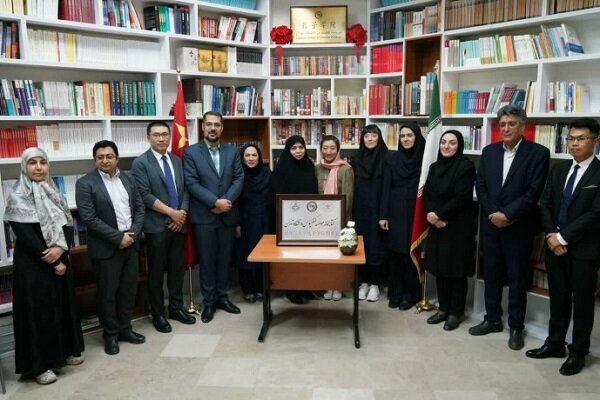First specialized Chinese library in Iran opens at University of Tehran

TEHRAN- The first specialized Chinese library in Iran was inaugurated on Wednesday at the Faculty of Foreign Languages and Literatures, the University of Tehran.
Hamed Vafaei, the head of the Confucius Institute at the University of Tehran and the key figure behind the establishment of the library, introduced the collection housed within the library. He highlighted the importance of the initiative, stating, “With the support of the Faculty of Foreign Languages and Literatures and the International Affairs Office of the University of Tehran, we have successfully established, for the first time in Iran, a comprehensive collection of original Chinese works covering diverse subjects related to China”.
Vafaei elaborated that the library’s collection includes 4,000 volumes of original Chinese texts, covering a wide range of topics such as language education, classical and contemporary literature, history, philosophy, geography, and politics in China, Mehr reported.
He pointed out that the lack of primary sources has been a significant challenge for Chinese studies and related research in Iran. The establishment of such a library is a critical step toward overcoming this obstacle and offers hope for a brighter future in this academic field.
Farideh Alavi, Dean of the Faculty of Foreign Languages and Literatures at the University of Tehran expressed her gratitude to the Confucius Institute for its role in establishing the library. She described the presence of this comprehensive reference collection as an honor for the University of Tehran.
Alavi emphasized the importance of the faculty as one of the few scientific centers in the country that not only focuses on language education but also the direct study of the literature of major world nations. She described the establishment of the library as a positive move toward a deeper, more direct understanding of the Chinese language and culture.
Abdolmajid Eskandari, Director General of International Cooperation at the University of Tehran, likened the hundreds of reference books in the original Chinese language available at the university to a treasure that would pave the way for extensive research by scholars across various fields.
Also speaking at the event, an official with the Chinese Embassy in Iran praised the University of Tehran's efforts in advancing Chinese studies. The official remarked that the university is currently at the forefront of fundamental research and studies related to China in Iran, and the international achievements of its Chinese language and literature students stand as a testament to this success.
SS/SAB
